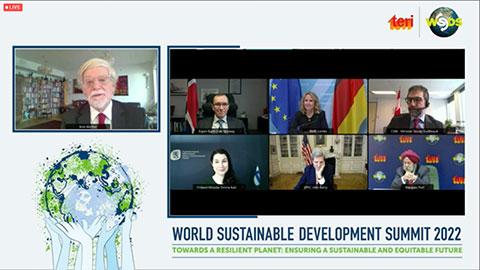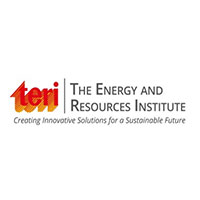Mr John Kerry and six world leaders call for “monumental transformation” in the way we deal with sustainability

New Delhi, 17 February 2022: Asserting that the climate crisis is the single greatest security challenge that we all face, Mr John Forbes Kerry, Special Presidential Envoy for Climate, United States, called for "monumental transformation" in the way we deal with the concept of sustainability. Mr Kerry was speaking at the 21st edition of the World Sustainable Development Summit (WSDS) on Wednesday in New Delhi. Speaking at a ministerial session on ‘Ambition and Action in the Critical Decade for addressing Climate Change and Realizing Sustainable Development’, which was attended by Ministers of Environment from Canada, Norway, Germany, Finland, France and Spain, Mr Kerry pointed out that, "Given the population growth rate on the planet, the level of current resource utilization is rapacious and not at all geared to the prospect of sustainability."
Commending the ambitious goals of 500 GW renewables by 2030 set by Prime Minister Mr Narendra Modi in Glasgow, Mr Kerry said, "The criticality of achieving that goal was very simple. It is the only way that India itself becomes compliant with the 1.5-degree goal, which we all ratified in Glasgow recently." He also noted that twenty countries on the planet account for 80 per cent of all emissions. "Unfortunately some of those countries are not yet adopting plans to do what the science tells us we do which is needed to reach the 1.5 degree Celsius and cut our emissions by 45 per cent in the course of this next 8 year period."
During the session, international dignitaries advocated the reduction of wasteful consumption and ways to promote sustainable production patterns by raising awareness and encouraging responsible practices by all stakeholders, including governments, businesses and consumers. The world leaders pressed for a deeper understanding and significance of Sustainable Consumption and Production (SCP), which is one of the core elements of the global sustainable development agenda.
During the ministerial hosted on Day One of The Energy And Resources Institute (TERI)’s WSDS, Ms Teresa Ribera Rodríguez, Hon'ble Minister, Ministry for the Ecological Transition and Demographic Challenge, Spain, said, "We have come together to discuss ways of moving from being a linear economy to a circular economy, which is the need of the hour. We cannot consume beyond what the earth and ecological system provide us." Ms Rodríguez said that adopting news ways of production and consumption is bound to be challenging. "With respect to producers, we need eco-friendly product designs, better use of raw materials, seamless production methods, and sustainable ways to put the products to the market. We need a robust policy structure so that these processes strictly adhere to a zero-waste policy. On the other hand, we equally need smart consumers, who consume more consciously and know what to choose. It will help the system reduce the overall wasteful consumption, focusing on the consumption of those goods that are truly needed in the global process. There is a need to promote a synergic alliance between consumers, producers and innovators; only then can we successfully reduce our carbon footprint."
Ms Barbara Pompili, Hon’ble Minister of Ecological Transition, France, said, "The objective of a resilient planet is to ensure a sustainable and just future throws light on the challenges we collectively have to face due to the evolution of world life, climate change and the loss of biodiversity. We are all one, in facing the consequences and developed countries will have to show the way. Our partnership with India is key to achieving ambitious and equitable solutions."
Dignitaries at the ministerial session pressed for the implementation of SDG 12 effectively in the post-COVID world and the need to move away from the unilateral focus on private or corporate production and consumption patterns. Asserting the need for sustainable practices, Ms Espen Barth Eide, Hon'ble Minister, Ministry of Climate and Environment, Norway, said, "We see movement in the private sector, pumping in green capital and organizations moving consciously towards a sustainable, renewable and circular economy. The role of governments is no longer to tell the businesses about the green shift. They already know about it. It is more about creating the infrastructure, setting the framework for tax system, bringing resources together, using incentives, regulations, prohibitions and recommendations in order to accelerate this change."
Pressing on the issue of sustainable production and sustainable consumption, Ms Steffi Lemke, Hon'ble Minister, Federal Ministry for the Environment, Nature Conservation, Nuclear Safety and Consumer Protection, Germany, said, "We have around 8 years left to implement the 2030 agenda for 'sustainable development'. Sustainable consumption is one of the key elements of the agenda, and to achieve it we need to focus on sustainable finance. We have to make sure that investments are transparent so that public and private investors can invest their money effectively in environmental protection and climate action. For better recovery and make sure these investments do not reach a status quo, we need a whole toolbox of legal, political and economic instruments."
During the event Mr Steven Guilbeault, Hon’ble Minister of Environment and Climate Change, Canada said, "The world can no longer ignore the cost of the natural environment by an unstained consumption and production we have seen in recent decades." Ms Emma Kari, Minister of the Environment and Climate Change, Finland, added, "How and what we produce have a big impact on Sustainable Development. The overconsumption of natural resources is one of the key challenges we have to tackle together."
The ministerial session was moderated by Mr Manjeev Singh Puri, former Ambassador and Distinguished Fellow, TERI and Mr Arne Walther, Former Chairman, International Energy Agency.
About TERI
The Energy and Resources Institute (TERI) is an independent, multi-dimensional research organization, with capabilities in policy research, technology development, and implementation. Headquartered in New Delhi, TERI has regional centres and campuses in Gurugram, Bengaluru, Guwahati, Mumbai, Panaji, and Nainital, supported by a multi-disciplinary team of scientists, sociologists, economists, engineers, administrative professional and state-of-the-art infrastructure.


